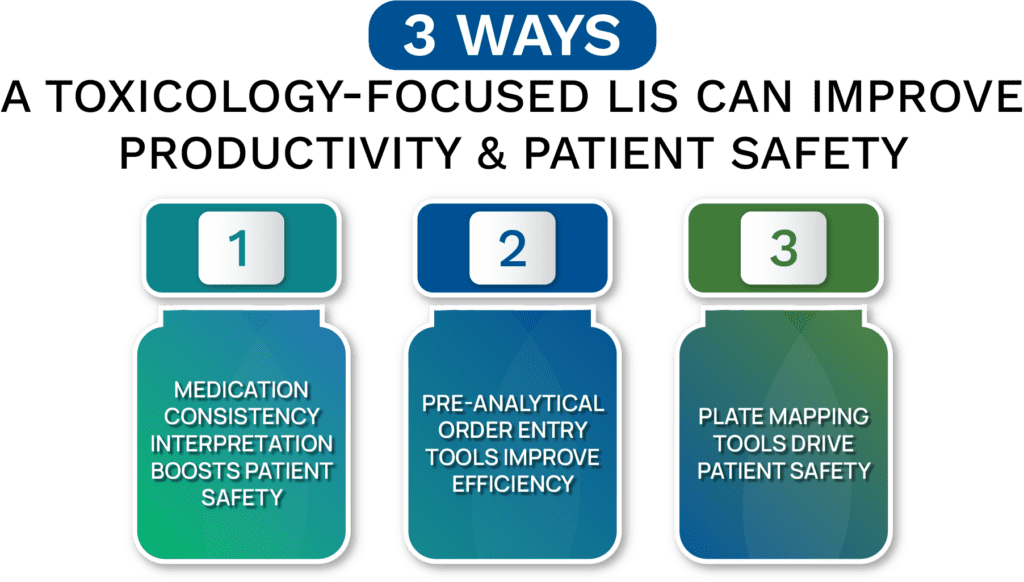Every laboratory strives to be as productive and efficient as possible, and patient safety is always a core goal. Providing valuable laboratory services that clinicians can trust requires diligent management and tools that support these goals. Toxicology laboratories deal with sensitive test results, many of which, if reported erroneously, can have a serious negative impact on patients. Therefore, it is vitally important to automate, error-proof, and streamline your processes so your lab can provide maximum contributions to patient care.
Below are three areas specific to toxicology testing where the setup of your laboratory information system (LIS) can help improve productivity and patient safety.

1. Medication Consistency Interpretation Boosts Patient Safety
Medication names can be confusing—brand names, generic names, chemical names, and drug metabolites are all part of the equation—and name confusion is a known factor that contributes to medication errors.
Toxicology labs can use their LISs to help manage drug names and give providers the information they need to give the best patient care. An LIS with toxicology-specific functionality can associate medications with aliases to identify generic or street names and map to the appropriate analyte.
You can also define medication and metabolite relationships to indicate consistency with a patient’s prescribed medications and alert providers on the report when there are inconsistencies between prescribed medications and test results.
2. Pre-analytical Order Entry Tools Improve Efficiency
Regulations and billing conventions change frequently and can be confusing, making it difficult to stay current without LIS support. For example, medical necessity rules and local coverage determinations (LCD) are updated annually, like the recent LCD limit on confirmatory testing frequency for drug testing. Payors are becoming stricter about what they consider reasonable and necessary and have added extensive prior authorization requirements.
Your LIS can help eliminate errors and streamline order entry. Laboratory professionals can rely on the LIS’ decision-support logic to enforce medical necessity and frequency checks and can trust the LIS will automate drug class bundling (G-code billing). You can enable rules to reflex confirmatory testing based on screening results and medications and use order entry rules to support prior authorization efforts by flagging and requiring an authorization number at order entry.
3. Plate Mapping Tools Drive Patient Safety
Managing large batches of test samples takes meticulous tracking and attention to detail. It can be easy to make errors when data is tracked in a large spreadsheet, as it often is for molecular testing.
A toxicology-focused LIS can identify pipetting errors and carryover contamination to improve accuracy and patient safety. As a time-saving feature, the LIS allows for digital scan and export of an acquisition file in one step and batch management for confirmatory tests.
A Toxicology-focused LIS
Toxicology labs face unique challenges and have specific reporting needs. A toxicology-focused LIS that includes specific functionality to address these requirements and track testing can be a big boon for a fast-paced toxicology laboratory.
Visit our website to learn more about Orchard Software’s Toxicology product:
